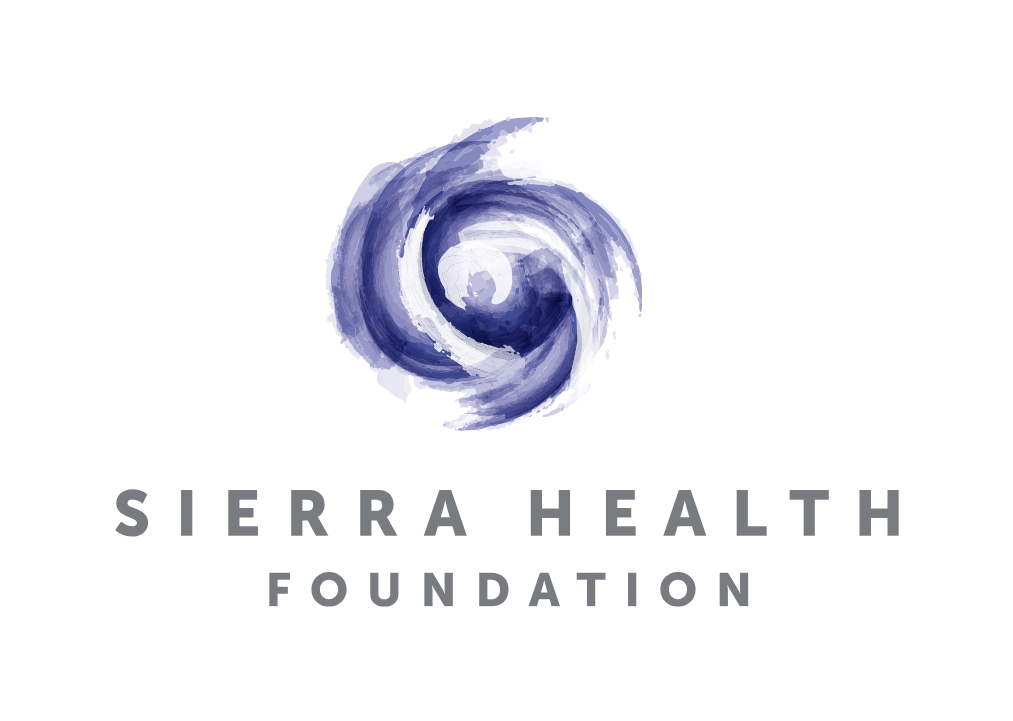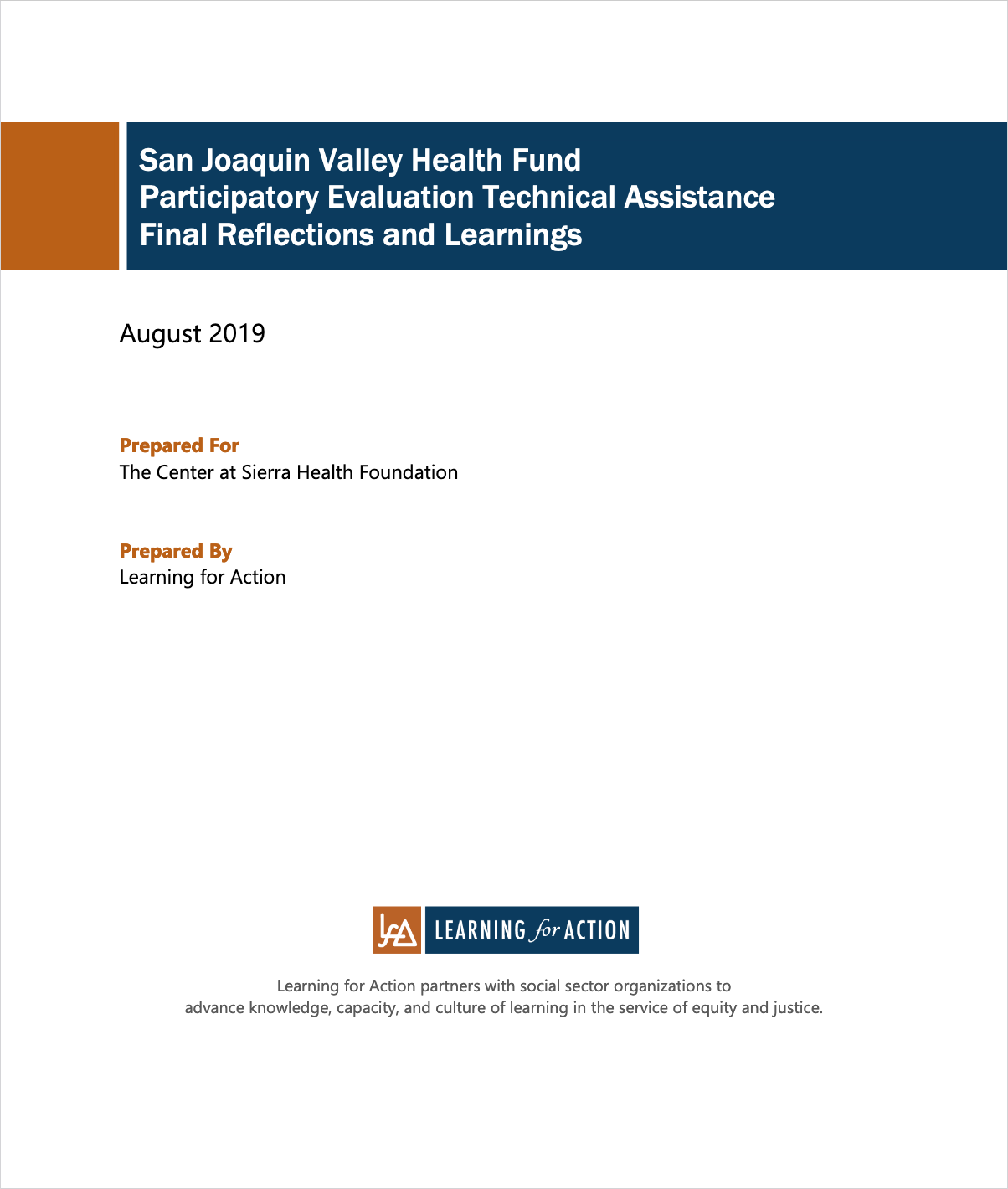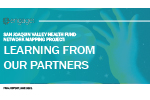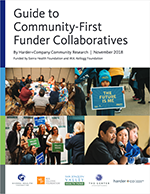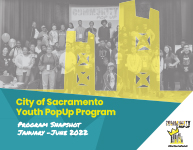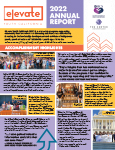Evaluation and Learning
Sierra Health Foundation and The Center at Sierra Health Foundation pursue the use of equity-focused, culturally responsive, community-centered evaluation for learning, actionable knowledge and accountability.
Learning
We support organizational learning about program implementation and other internal processes to increase the effectiveness of our work.
Examples:
San Joaquin Valley Health Fund Participatory Evaluation Technical Assistance Final Reflections and Learnings
Actionable Knowledge
We ask questions and gather information about processes, programs and systems, and share that knowledge to support movement-building and advocacy for health and racial equity by our partners and other stakeholders.
Examples:
San Joaquin Valley Health Fund Network Mapping Project: Learning From Our Partners (.pdf)
Social Network Analysis brief: San Joaquin Valley Health Fund: A Catalyst for a Regional Advocacy Network (.pdf)
Guide to Community-First Funder Collaboratives
Accountability
As the steward of funding from public and private sources, we provide information needed to assure funders that community partners and The Center are carrying out the work consistent with the intent of the investment.
Examples:
City of Sacramento Youth PopUp Program Snapshot January-June 2022
Elevate Youth California 2022 Annual Report
Community and Economic Development Publications
Black Child Legacy Campaign
- Transformative Justice Community: A Countywide Evaluation of the Black Child Legacy Campaign (.pdf)
- The Foundation of a Revolution: Five Years of Legacy (.pdf)
- Black Child Legacy Campaign: An Action Guide 2020 (.pdf)
- Annual Summary 2020 (.pdf)
- A Framework for Effective Cultural Broker Service Delivery 2019 (.pdf)
- Crime and Safety Report FY2019 (.pdf)
- Crime and Safety Report FY2018 (.pdf)
- Annual Report 2018 (.pdf)
- Community Indicator Report 2017 (.pdf)
- Black Child Causes of Death (.pdf)
- Annual Report 2016-2017 (.pdf)
- Annual Report 2015-2016 (.pdf)
- Implementation Plan 2015-20 (.pdf)
- Strategic Plan 2015 (.pdf)
- Sacramento County Blue Ribbon Commission Report 2013 (.pdf)
Healing The Hood
Health Access and Equity Publications
Healthy Youth Development Publications
California Funders for Boys and Men of Color
Elevate Youth California
- Elevate Youth California 2022 Annual Report (.pdf)
- Elevate Youth California 2021 Annual Report (.pdf)
- Elevate Youth California 2020 Annual Report (.pdf)
My Brother’s Keeper Sacramento
Positive Youth Justice Initiative
- Organizing for a Healthy Justice System: Positive Youth Justice Initiative Final Evaluation Report (.pdf)
- Community Victories: Summary of Policy Achievements (.pdf)
- Disrupting the School-to-Prison Pipeline (.pdf)
- Highlights of Youth Involvement (.pdf)
- Transforming Juvenile Corrections (.pdf)
- Moving Positive Youth Justice Forward (.pdf)
- The Beat Within 2019 (.pdf)
- The Beat Within 2017 (.pdf)
- Youth Justice System Advocacy Guide (.pdf)
- Advancing Employment Opportunities for California’s Foster Care and Justice-Involved Youth (.pdf)
- Adverse Childhood Experiences, Toxic Stress, and Implications for Juvenile Justice (.pdf)
- Positive Youth Justice Initiative Briefing Paper (.pdf)
- Renewing Juvenile Justice (.pdf)
San Joaquin Valley Health Fund Publications
- San Joaquin Valley Health Fund Participatory Evaluation Technical Assistance Final Reflections and Learnings (.pdf)
- Guide to Community-First Funder Collaboratives (.pdf)
- San Joaquin Valley Health Fund: Its Origins, Progress, and Future (.pdf)
- Kern County: Geography of Inequity and Opportunities for Action (.pdf)
- California’s San Joaquin Valley: A Region and Its Children Under Stress (.pdf)
- Mapping Opportunity in California’s San Joaquin Valley (.pdf)
- IHHEEL Issue Briefs (.pdf)
Evaluation and Learning Department
Department staff have different cultural identities, professional backgrounds and life experiences. The rich diversity of their perspectives and their shared vision of equity-focused, culturally responsive, community-centered evaluation informs the practice of the department.
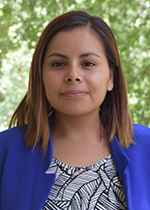
Noemi Avalos
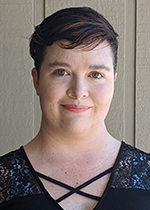
Erin Hassett

Elaine Lander
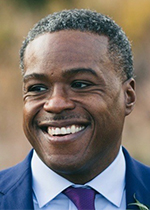
Maurice Samuels
Resources
The Evaluation Department is guided by professional standards and guidelines, including:
